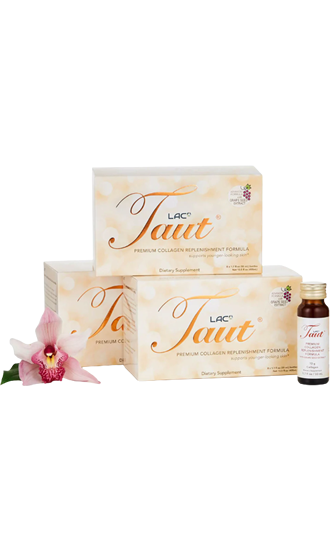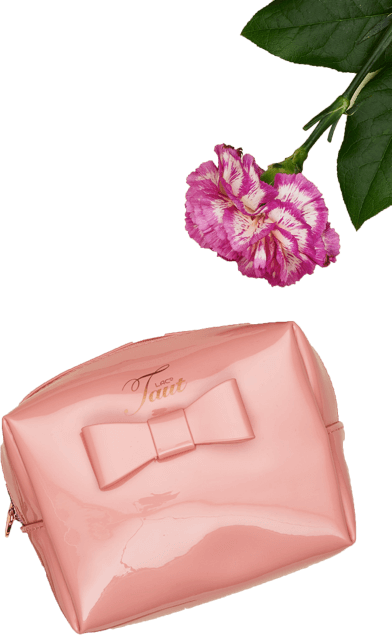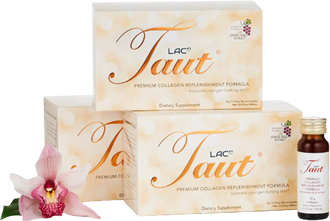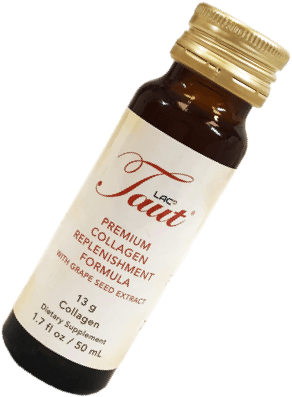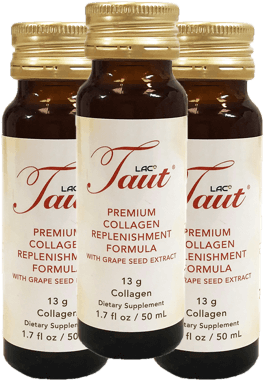Collagen and Elastin: Where Is It Found in the Skin & What Is It?

Like the Beyonce and Jay-Z of skincare, collagen and elastin are the power couple we all need to know about.
These two proteins are responsible for the strength and elasticity of our skin, as well as playing some other key roles in your body's health and wellbeing. Unfortunately, as we get older and other environmental factors begin to take their toll, we start to lose our natural supplies of these proteins.
Luckily, with the best skin care products and some diet and lifestyle changes, we can maximize our supplies of these power proteins. Keep reading to find out what collagen and elastin can do for you!
What Is Collagen?
Although we often describe collagen as one thing, it's actually a family of fibrous proteins in humans and animals that forms the structure of connective tissue, skin, bones, joints, tendons, and teeth. The word collagen comes from the Greek word 'kólla', which means glue – an apt name, as the collagen family functions like a glue that holds our bodies together!
Collagen is the most abundant protein in the human body, accounting for about a third of the body's total protein content. Collagen forms the structural foundation of our skin, responsible mainly for strength and overall firmness. 1
More helpful reading: Collagen meaning
What Is Elastin?
Elastin is another fibrous protein that's present in many organs and tissues in the human body, including the dermis, connective tissues, lungs, and blood vessels. As the name suggests, elastin is essential to the function of our elastic tissue (which is any part of the human body that can stretch, bend, and bounce back into place).
Elastin improves skin elasticity, helping our complexions to bounce back from daily wear and tear. 2
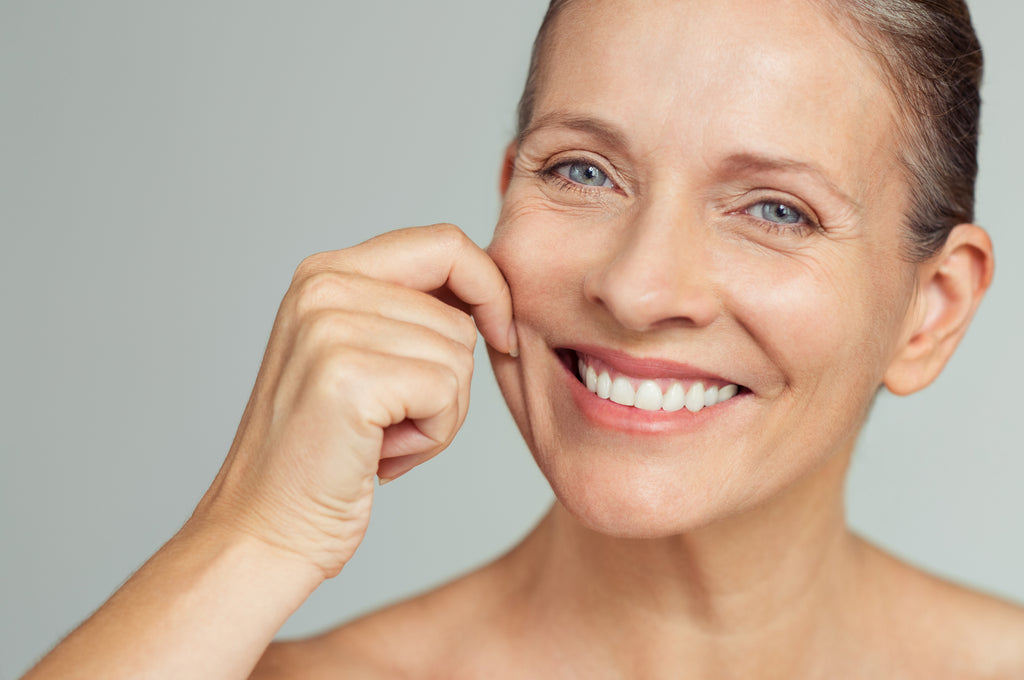
More helpful reading: Elastin definition
Collagen and Elastin in the Human Body
Let's take a closer look at how these two proteins function in the human body:
Collagen and Elastin Production
To understand how these two proteins function, it's important to look at how and where they come together in the body. You'll find collagen and elastin in the extracellular matrix (ECM), which is an important cell-communicating layer in many tissues throughout the body.
The ECM is a fibrous network of collagen, elastin, hyaluronic acid, molecules, and the cells that make these essential proteins. Elastin and collagen-producing cells called fibroblasts are responsible for twisting amino acids into chain structures, before secreting them into the ECM and forming a collagen fiber or an elastin fiber.
Where Are Collagen and Elastin Found?
So where exactly do we find this extracellular matrix structure, and what do collagen and elastin do for our bodies? Let's take a look:
Skin
Of course, the main reason we beauty addicts are here is this one! Elastin and collagen fibrils form an essential structural support system for our skin, and we need them both to maintain our youthful, glowing skin. You'll find these proteins in the dermis, which is the middle layer of your skin.
Connective Tissues
Collagen and elastin are also key components in various connective tissues in our bodies, most notably in our joints and our muscles.
Collagen gives structure and strength to our cartilage, allowing our joints to absorb shock and remain resistant to daily wear and tear. It also makes up about 6% of our muscle mass. 3
Elastin is responsible for the flexibility of our joints and muscles, allowing them to recoil and get back to their natural shape after being stretched, bent, or contracted.
More helpful reading: Collagen for joints
Arteries
Collagen plays an important role in the structure of blood vessels, giving them strength and structure that allows a healthy blood flow to the heart. Elastin maintains flexibility in the blood vessels and regulates vascular activity. 4

7 Ways to Support Elastin & Collagen Production for Healthy Skin
If you're wondering how to increase collagen and elastin, there are some simple yet important skincare tips you should know about. Our experts weigh in with the best advice:
1. Avoid Sun Damage
Of all of the environmental factors that contribute to the decline of our collagen and elastin supplies, sun exposure is the biggest culprit. In fact, research suggests that sun damage accounts for 80% of extrinsic skin aging – which is a whole lot of skin damage! 5
Why does this happen? Well, when our skin is exposed to UVA and UVB rays without adequate sun protection, these harmful rays penetrate deep into the dermis and trigger enzymes to create a buildup of abnormal elastin. This isn't the good kind of elastin that helps our skin, it's quite the opposite! These enzymes actually weaken your collagen supplies, causing irreversible skin damage (not to mention increasing the risk of skin cancer).
So if you want to avoid premature wrinkles and hyperpigmentation, make sure you always wear SPF sunscreen on exposed skin, cover up your skin on sunny days with loose clothing, and avoid the sun during the hottest parts of the day (11 am to 2 pm).
Discover more of RenewSkin Inc.'s summer skin care tips here.
2. Maintain a Healthy Diet
When it comes to choosing foods good for skin, balance is key. Contrary to what the latest fad will have you believe, there's no one "superfood" that will maintain your collagen and elastin and keep your skin healthy. There are, however, some things that damage your skin that you need to be aware of.
Here are our plain and simple tips for a balanced diet that can help keep your skin strong and youthful:
- Eat plenty of fruit and veggies to keep antioxidant activity high and stave off harmful free radicals.
- Proteins like meat, poultry, dairy, eggs, nuts, and seeds are foods that boost collagen and elastin because they contain the amino acids needed to build protein chains.
- Avoid excess sugar, because high blood sugar levels can create free radicals that attack your collagen and elastin supplies.
- Cut back on alcohol to reduce toxins in your bloodstream and reduce harmful inflammation.
Follow these basic principles as part of a healthy lifestyle and your skin will thank you for it!

Why is sugar bad for skin? RenewSkin Inc. explains.
3. Try Collagen & Elastin Supplements
A collagen and elastin supplement supports your body's natural production of these essential proteins. They contain elastin and collagen molecules that have been broken down into nano-sized peptides by a process called hydrolysis. When we ingest these peptides, they enter the bloodstream and signal to our fibroblast cells that the body needs more collagen and elastin proteins. They provide the essential nutrients needed to create more collagen and elastin and trigger our fibroblasts into action.
Although there's an increasing supply of collagen supplements in the beauty world, you have to make sure you use a high-quality supplement to really reap the benefits for your skin. The main things to look out for are:
- It contains hydrolyzed collagen peptides – if not hydrolyzed, your body won't be able to digest it properly
- It contains type I collagen – the type needed for healthy skin
- It contains a high dose of collagen – ideally 10,000 mg or higher
- It contains collagen, elastin, and other skin-supporting ingredients
Not all collagen supplements contain both collagen and elastin, but Taut Liquid Collagen certainly does. Our unique formula contains a combination of 13,000 mg of hydrolyzed marine collagen peptides and elastin peptides, which work simultaneously to support collagen formation in the body and boost elastin for improved skin elasticity.
One bottle of our delicious orange formula (real orange juice and stevia, no nasty preservatives!) can increase collagen content in the dermis and boost skin strength. Each bottle also contains hyaluronic acid, grape seed extract, vitamins C and B6, and ceramide – a dream team that will fight against fine lines and wrinkles and restore your youthful radiance!
4. Use Vitamin C & Other Antioxidants
Vitamin C is a cofactor in both collagen and elastin production. It activates enzymes in the body that complete the elastin and collagen production process. It's also an antioxidant that neutralizes free radicals in the body, protecting your skin against harmful inflammation. 6
You can get a healthy dose of vitamin goodness in your diet by eating plenty of citrus fruits, red bell peppers, sweet potatoes, and leafy greens. When it comes to maintaining skin health, vitamin C skincare is also a must.
Vitamin C in skin care products like serums and masks can help boost collagen and elastin production in the dermis. This can help improve your skin's radiance, reduce pigmentation and dullness, and reduce the appearance of fine lines and wrinkles for a more youthful appearance.
Taut Collagen Mask is our luxurious sheet mask infused with vitamin C and hydrolyzed marine collagen peptides to brighten your skin, reduce inflammation and redness, and plump up your complexion for a more youthful appearance.
It contains hydrolyzed collagen small enough to penetrate through the epidermis (outer layer of your skin), which can boost collagen levels in just 15 minutes to make skin firm and radiant.
While supporting collagen and elastin in your dermis, this facial treatment also hydrates and softens your skin with hyaluronic acid and botanical squalene. It's the perfect way to relax and rejuvenate your skin after a long day, or to treat yourself before a night on the town!
More helpful reading: Anti aging foods
5. Add Hyaluronic Acid to Your Routine
There is a third vital component of the dermis that contributes to your skin's appearance. Collagen, elastin, and hyaluronic acid are the three musketeers of healthy skin!
Hyaluronic acid is a gooey gel-like substance that attracts and retains water in your skin, and it functions. to fill out the free spaces between collagen and elastin proteins in the dermis, maintaining elasticity and stretch. Using a hyaluronic acid serum, moisturizer, or face mask can seriously boost your skin's hydration levels, while also keeping your collagen and elastin proteins healthy and protected.
For a whole-body solution with the best results, try Taut Hydrate hyaluronic acid pills.
Designed to work on your body and not just your face, Taut Hydrate is packed with high-potency plant-based Hyaluronic Acid and Grape Seed Extract, two ingredients that work synergistically to improve skin elasticity and plumpness and visibly reduce signs of skin imperfections.
The best thing about these skin-loving supplements is that they support your skin's health from the inside out, working alongside elastin and collagen in the dermis to create a thriving, healthy skin support system.
More helpful reading: Marionette lines treatment
6. Use Retinol
Retinol is an anti-aging ingredient derived from vitamin A, considered gold-standard by beauty addicts because it helps skin to replenish and rejuvenate quickly. It helps support the production of collagen in your dermis, which has a myriad of anti-aging benefits!
The benefits of retinol include:
- Faster skin cell turnover (fewer dead skin cells = brighter skin!)
- Increased collagen production
- Reduced fine lines and wrinkles
- Faded pigmentation, scars, and other blemishes
- Fewer acne breakouts
You'll find it in serums and night creams designed to tackle aged skin. If you'd like to add it to your routine, start with a low dose just a few times per week, as it is a harsh ingredient that can cause irritation, redness, and warmth until your skin adjusts.
More helpful reading: Vitamin A & skin
7. Collagen Facials & Treatments
If you want to support elastin and collagen in your skin, you can also ask your dermatologist about a collagen treatment for face and body benefits.
There are a number of treatments out there that can help encourage the growth of new skin cells and increase the rate of collagen synthesis in your dermis. Some examples include:
- LED light therapy uses infrared light to penetrate into the dermis to create heat and activate your fibroblasts cells, resulting in more collagen production.
- Laser resurfacing uses lasers to burn away the outer layer of your skin, activating a healing response in your body to create new, fresh tissue that looks younger and brighter.
- Microneedling is a treatment that uses a handheld roller device covered in tiny needles to create pinprick wounds on your skin, which activates a wound repair response in your fibroblasts to produce more collagen.
These treatments are great options for anyone who wants to boost their skin quality and texture beyond the abilities of their at-home skincare routine.
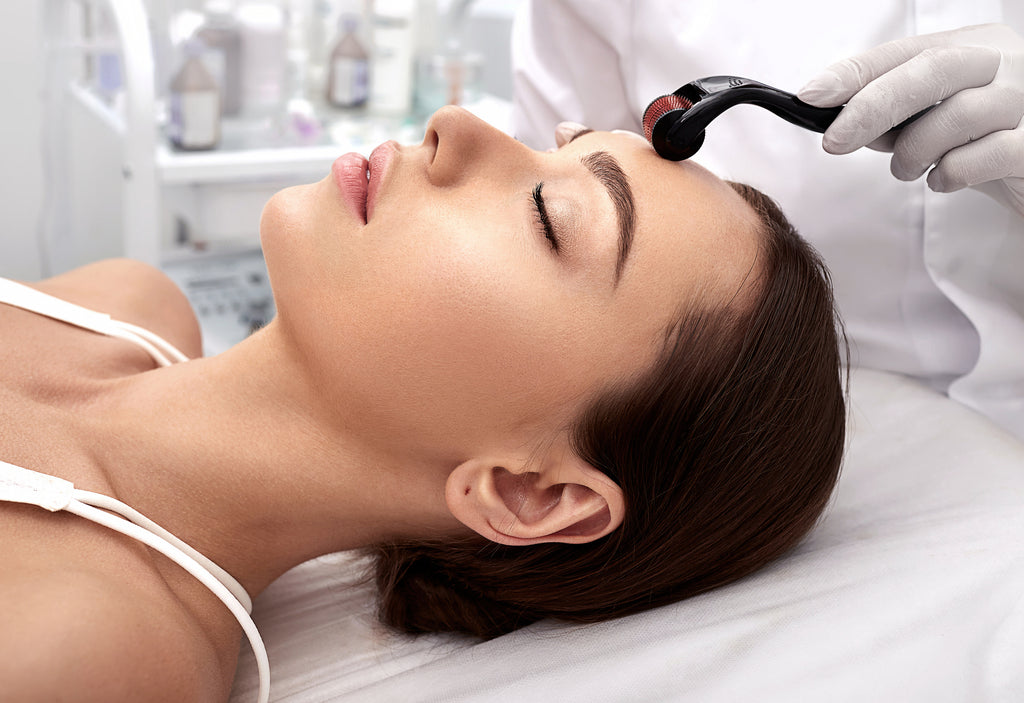
Rediscover Youthful Skin with Taut
We know your skin is important to you. Whether you love glitz and glamour or you prefer a natural look, your skin is the foundation for everything. Treating your skin right will go a long way in achieving a youthful, radiant look, and the foundations your skin needs are collagen and elastin.
Give your skin the right support with our Ultimate Transformation Program, a trio of our best beauty products that help speed up collagen formation, improve skin elasticity, and maximize your radiance over the course of three weeks. It contains:
- Taut Liquid Collagen Drink – to maximize skin strength and flexibility from the inside out
- Taut Hydrate – to hydrate, plump, and protect
- Taut Collagen Mask – to sit back, relax, and shine!
Together, these three skincare heroes can help fight back against the skin aging process, improving your skin's appearance and giving you the youthful, taut look of your dreams!
Did you know that you can save up to 15% on your transformation program when you subscribe to our auto-ship program? Check it out!
References:
- https://www.ncbi.nlm.nih.gov/books/NBK21582/
- https://www.ncbi.nlm.nih.gov/pmc/articles/PMC8239663/
- https://www.news-medical.net/health/What-is-Collagen
- https://pubmed.ncbi.nlm.nih.gov/8575262/
- https://www.ncbi.nlm.nih.gov/pmc/articles/PMC3790843/
- https://www.sciencedirect.com/topics/engineering/collagen-synthesis





